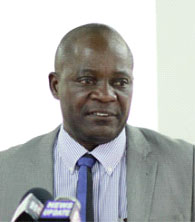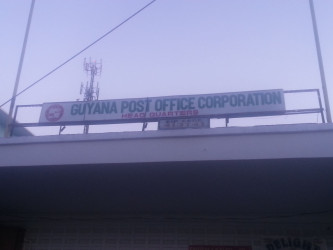The Guyana Post Office Corporation (GPOC) plans to start the process to acquire a ZIP code for Guyana.
This is according to GPOC Public Relations Officer Telesha Whyte.
Although the sign at the top of the corporation’s headquarters indicates that 413741 is the country’s ZIP code, Guy-ana does not have a ZIP code.
Many Guyanese are of the belief that this sign is accurate since the code has been circulated as legitimate. However, Whyte said the corporation would be removing the sign.
A ZIP Code, also known as a postal code, is a series of letters and/or digits, sometimes including spaces or punctuation, included in a postal address for the purpose of sorting mail. Despite the absence of such a code, Guyana’s postal system is governed by an internal postal code that aids in the dissemination of mail.
Receiving directions and locating places is sometimes difficult because not everyone is aware of the location of areas especially the meandering streets. In many instances, directions depend on “word of mouth” and the use of landmarks. This is sometimes a hassle and time consuming for businesses that deliver.
University of Guyana Vice-Chancellor Dr Jacob Opadeyi, who was involved in the development of the Trinidad and Tobago Postal Code, told Stabroek News that it would be easy to implement a postal code in Guyana and the process could be done within three months.


The structure of regional division and communities exists. Therefore, he suggests that the six digits that make up a postal code be composed of the region, community and street block. For example, a building in Buxton bearing the code 041011 would indicate the building is located in Region 4, community number 10 and the block number 11.
Opadeyi noted that there would be some challenges but it should be an opportunity for the Regional Democratic Councils (RDCs) to correct the issues of streets that do not have legal names. Duplications of street names will also pose a hurdle but one that could be overcome through collaboration with other agencies.
He said there is funding from United Nations bodies for the modernisation of the system.
Opadeyi recommended that the project to assign postal codes start in Region Four and that persons be trained in the GPOC to replicate it in the other regions.
This system, he said, would improve efficiency and accuracy of locating addresses and improve mail delivery as well as saving on time and operating costs.
He added that the code would guarantee more accuracy instead of using names of villages that can be spelt incorrectly by the addresser, which can cause a delay in delivery.
It is particularly necessary to have a ZIP code when shopping online since websites require this information and it is increasingly becoming an international standard.
Opadeyi said a code can also aid in emergencies through the creation of a computerised database that would log directions. Most importantly, it can be developed into a mechanism to generate revenue since it can aggregate customers within a particular area and give an informed market strategy, he added.








